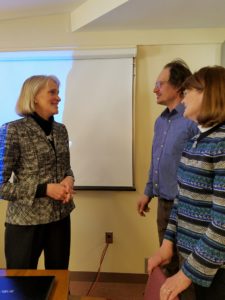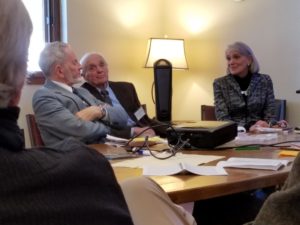First Sunday in Lent
February 18, 2018
Good Shepherd Lutheran Church
Decorah, Iowa
Rev. Amy Zalk Larson
Click here to read scripture passages for the day.
Beloved of God, grace to you and peace in the name of Jesus. And, Beloved, what can we do about the gun violence in our country?
This week, yet again, we’re angry, we’re sad. We feel hopeless and yet we know we need to take action.
Something has to change. We cannot continue to watch these events unfold and do nothing.
It seems God has similar feelings. Today we heard the end of the story of Noah and the flood, but it helps to start with the beginning of the story.
We’re told throughout Genesis, chapter 6: “The Lord saw that the wickedness of humankind was great in the earth … And the Lord was sorry that he had made humankind on the earth, and it grieved him to his heart … Now the earth was corrupt in God’s sight, and the earth was filled with violence … And God said to Noah, ‘I have determined to make an end of all flesh, for the earth is filled with violence because of them, now I am going to destroy them along with the earth.’ ”
God also was grieved about all the corruption and violence on the earth. God refused to simply watch it unfold and do nothing.
God decided to act- to destroy all flesh and all creation and start over again with just a small remnant of people and creatures.
This is a troubling story. I’ve always wondered why we emphasize it with children so much. I know the animals can be cute, but why do we think divinely driven genocide and global annihilation make up a good bedtime story? Good night, sleep tight, don’t get washed away by a flood tonight?
This is a troubling story and yet I’m also grateful that we have a God who is grieved by human corruption and violence, rather than a God who’s some kind of unmoved mover – unaffected and uninvolved in creation. God is troubled by the ways we harm each other. God is bent on justice for the sake of the flourishing of all creation.
So, God sent a flood in the days of Noah.
But then after the flood, we hear in chapter 8, “the Lord said in his heart, ‘I will never … again destroy every living creature as I have done.’ ” And then, in chapter 9, God made an everlasting covenant with all living flesh, promising to never again send a flood to destroy the earth.
God is still, and always, bent on justice; but it seems God has decided that anger from a distance is not the answer. Instead, God has committed to be even more involved with creation by making an everlasting covenant with all flesh. God has pledged to be actively engaged in the flourishing of life to bring about justice and compassion through relationship with flesh.
Anger and destruction from on high would keep God removed from all the violence and corruption. In- stead, God has moved in closer. We see this in all the covenants God makes with people throughout the Old Testament – covenants we’ll hear about this Lent. We see this most fully in Jesus who gives the new covenant in his blood – a covenant of non-violent, self-giving love.
God not only made a covenant with all flesh; God, in Jesus, also became flesh and dwelt among us. Jesus entered into all that we face: desert times, temptations, suffering and death. He got angry at injustice but could not be stopped from loving us – even when we killed him. He rose again and comes to us still in his body and blood. God, in Jesus, does not remain at a distance but moves in very close.
We need to do the same when it comes to addressing gun violence and other difficult issues we face.
We need to turn away from anger at a distance. We can’t simply post rants on Facebook; we can’t get angry at everyone else from afar. We, like God, must get more involved with God’s creation for the sake of the flourishing of life. We must commit to engage and move in closer.
This is our work as people of God’s covenant. We have been brought into God’s covenant with all flesh in a very personal and powerful way through baptism. In baptism, we go through the waters that bring death to our sinful selves and we are brought into new life. As we heard in the 1 Peter reading, just as God saved Noah and his family in the flood, so baptism saves us from all that would cut us off from life, from God.
The new life we have been given is not for our sake alone. It is given to draw us into God’s work of bringing justice and mercy through us. Our baptism calls us into this work and compels us to move in close. We’re called to have difficult conversations with people we’d rather despise. We’re called to engage the political process for that is how we work for justice and mercy together. We’re called to go to places that make us uncomfortable, to keep working, to keep hoping.
We are doing this together now around the issue of immigration. Instead of just being angry from a distance about the broken immigration system in our country, we have become an AMMPARO congregation and are caring for the health needs of unaccompanied minors. We have moved in closer by calling and writing to our representatives in Congress. We have walked with our neighbors, the Campos family, as Raul was detained by ICE. Raul has been released on bail, but the journey still continues for the Campos family and we will stay in this journey for the long haul.
In these and so many other ways, we as God’s people are drawing near to others so that we can know God’s justice and compassion, so that life can flourish in our communities. We need to continue this work together, especially around the issue of gun violence
Beloved, we have what we need to do this work together. God has made a covenant with us in the rainbow and in the waters of baptism. We can move in close for God is always close to us.
Let’s take a moment for silent prayer.





